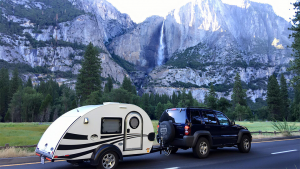Maker of the popular T@B and T@G teardrop trailers, nüCamp RV recently announced they’re adding a solar panel system to their facility in Sugarcreek, Ohio.
The eco-friendly move will offset about 80% of the power they need for manufacturing, and save about 500.5 tons of CO2 and 1,056 barrels of oil every year.
A million dollar investment, their new roof-mounted system will have more than 1,900 panels and greatly lower their energy costs in the long run.
Chief executive officer of nüCamp RV, Scott Hubble said:
We partnered with Paradise Energy Solutions to increase our efficiency and reduce the environmental impact of our manufacturing process. Our investment in a renewable, readily available energy source is part of our larger goal to protect and preserve the environment where our employees and customers live and play.”
Like nüCamp RV, Paradise Energy Solutions has a facility in Sugarcreek, Ohio.
The company offers residential, commercial, and agricultural solar panel systems for businesses, farmers, and homeowners.
Hubble added,
Working with Paradise Energy Solutions made sense. The company has a large presence in Sugarcreek and we couldn’t pass up the opportunity to execute a large-scale project with another local company.”
Solar panel systems are great investments for RVers, too. Using solar power allows you to boondock off-the-grid (away from those crowded RV parks), and saves money on campsites with electric hookups.
Besides producing T@B and T@G teardrop trailers, nüCamp RV also manufacturers top-of-the-line Cirrus truck campers. You can find more information about their company and campers on their website at nucampRV.com.



That’s great having solar panel options. I’m wondering what their solar panel watts and battery bank options are?
A tear drop trailer I assume has less electrical needs than larger RVs.
I’ve boondock in a 23′ RV for approx. 3 months in the Cascade Mountains during the summer months and my 125 watt solar panel couldn’t keep 3 deep cycle batteries charge up at all. I think to boondock in a standard size RV, in some areas of the country, more than a few nights, one needs more solar wattage such as 250-300+ watts and at least a half dozen true 12 volt deep cycle batteries. Your also going need to be in an area that gets enough sun for your solar system.
I tried using the RV’s 4000 watt geny to recharge the 3 batteries which didn’t really work I was requred to often use the geny.
If your batteries frequently fall below a certain percentage charged it’s going to take mostly likely 24 hours or longer to get them back to full charge.
It’s recommended to not allow your solar batteries to ever fall below 50 percent charge or their lifespan will be shortened.
What I did while booddocking rather than running the geny ~8 hours a day was use the RV mainly as shelter, keeping the batties charged enough for the absorption refrigerator and water pump. Quit using the RV furnace which has a 7 amp fan that drains the batteries. Eventually installed a catalytic heater mainly for boondocking.
A tear drop trailer with ~250 watt (+/-) solar panel and 3 or more batteries may be able to rely on solar power if there’s enough sun each day while boondocking longer than a few days.
If the solar isn’t able to keep the batteries charged and you don’t have a geny the tear drop trailer would become a shelter with minimal or no electricity such as for lights, water pump etc. which imo also works when camping and boondocking. One doesn’t always need the amenities electricity provides.
I guess much human civilization has started to take having electricity for granted and seem to forget it’s only been around ~100 years or less. We seem to also forget our ancestors never had or relied on electricity. It’s often treated we have had electricity since the advent of human civilization. There are some areas on the planet where humans still don’t rely on electricity or have only recently started to.
Anyway I think having solar is great, when it works, but often requires to have enough solar panels and batteries in order for it to properly work.